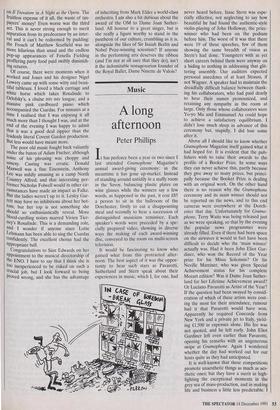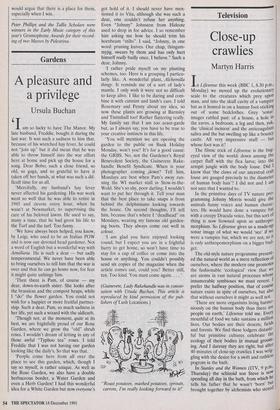Music
A long afternoon
Peter Phillips
It has perforce been a year or two since I last attended Gramophone Magazine's annual award-giving ceremony: in the meantime it has gone up-market. Instead of standing around untidily in a stuffy room in the Savoy, balancing plastic plates on wine glasses while the winners say a few words, as happened in the past, it cost £85 a person to sit in the ballroom of the Dorchester, firstly to eat a disappointing meal and secondly to hear a succession of distinguished musicians reminisce. Each speaker's words were preceded by a spe- cially prepared video, showing in diverse ways the making of each award-winning disc, conveyed to the room on multi-screen television.
It would be fascinating to know who gained what from this protracted after- noon. The best aspect of it was the oppor- tunity to hear such stars as Pavarotti, Sutherland and Stern speak about their experiences in music, which I, for one, had never heard before. Isaac Stern was espe- cially effective, not neglecting to say how beautiful he had found the authentic-style violin-playing of John Holloway, the prize- winner who had been on the podium before him. The worst of it was that there were 19 of these speeches, few of them showing the same breadth of vision as Stern's had done. Youngsters with as yet short careers behind them were anyway on a hiding to nothing in addressing that glit- tering assembly. Our auditors expected personal anecdotes of at least Strauss, if not Wagner. A speaker had to maintain the dreadfully difficult balance between thank- ing his collaborators, who had paid dearly to hear their names pronounced, and retaining any sympathy in the room at large. Only those whose collaborators were Yo-yo Ma and Emmanuel Ax could hope to achieve a satisfactory equilibrium. I didn't lose much sleep in advance of this ceremony but, stupidly, I did lose some after it.
Above all I should like to know whether Gramophone Magazine itself gained what it had hoped for. It is evident that the pub- lishers wish to raise their awards to the profile of a Booker Prize. In some ways they can never achieve this, partly because they give away so many prizes, but princi- pally because the Booker Prize is dealing with an original work. On the other hand there is no reason why the Gramophone ceremony and its main winner should not be reported on the news, and to this end cameras were everywhere at the Dorch- ester that day. Unfortunately for Gramo- phone, Terry Waite was being released just as we were speaking, so that by the evening the popular news programmes were already filled. Even if there had been space on the airwaves it would in fact have been difficult to decide who the 'main winner' actually was. Had it been John Eliot Gar- diner, who won the Record of the Year prize for his Missa Solemnis? Or Sir Neville Marriner, who was given Special Achievement status for his complete Mozart edition? Was it Dame Joan Suther- land for her Lifetime Achievement award? Or Luciano Pavarotti as Artist of the Year? If the question had been swayed by consid- eration of which of these artists were cost- ing the most for their attendance, rumour had it that Pavarotti would have won. Apparently he required Concorde from New York and a private jet to Italy, yield- ing £1,500 in expenses alone. His fee was not quoted, and he left early. John Eliot Gardiner left even earlier than Pavarotti, opening his remarks with an ungenerous swipe at Gramophone. Again I wondered whether the day had worked out for our hosts quite as they had anticipated.
It is well-known that these competitions promote unaesthetic things as much as aes- thetic ones; but they have a merit in high- lighting the exceptional moments in the grey sea of mass-production, and in making life and business a little less predictable. I would argue that there is a place for them, especially when I win.
Peter Phillips and the Tanis Scholars were winners in the Early Music category of this year's Gramophone Awards for their record- ing of two Masses by Palestrina.



































































 Previous page
Previous page